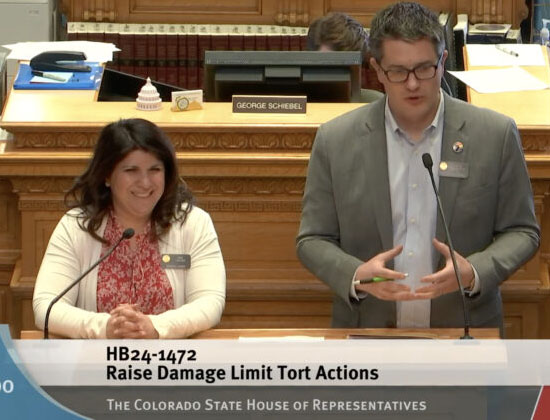MONDAY, JUNE 3, 2024 DENVER - Today, Governor Polis signed bills into law in ceremonies…

Colorado Gov. Jared Polis signs law raising damages cap for medical malpractice claims
Legislation resulted from tense negotiations between lawyers, business groups, insurance industry

By SETH KLAMANN | sklamann@denverpost.com | The Denver Post
Coloradans injured by medical malpractice will soon be able to seek more money from insurers and health care providers under new limits signed into law Monday by Gov. Jared Polis.
Under House Bill 1472, the state in coming years will raise various caps on civil damages in general, with some changes applying to medical malpractice cases. The general cap on noneconomic damages in civil lawsuits — typically for pain, suffering, impairment or other damages with subjective values — will rise to $1.5 million, up from $250,000. The law includes inflation adjustments into the future.
For medical malpractice cases, that noneconomic damages limit will increase from $300,000 to $875,000 over several years.
The damages cap for wrongful deaths will jump to $2.125 million, or up to $1.575 million for medical malpractice claims.
The increases for medical malpractice cases will unfold through 2029, with inflation adjustments after that. The law also allows siblings to file wrongful death suits on behalf of their deceased relatives in certain settings.
“I’m really proud that we’ve been able to come up with a solution that is workable for the business community, for the health care community — and we’ll make sure that victims can be appropriately compensated, or more appropriately than they are today,” Rep. Kyle Brown, a Louisville Democrat, said at a signing ceremony Monday. He sponsored the bill with fellow Democratic Sen. Kyle Mullica and Republicans Sen. Bob Gardner and House Minority Leader Rose Pugliese.
The legislation is the product of tense negotiations between the Colorado Trial Lawyers Association, on one side, and the medical and insurance industries, with backing from business groups, on the other.
Mullica, a Thornton emergency room nurse, compared the tension between the two sides to the Cuban Missile Crisis.
The trial lawyers had prepared a ballot measure that would fully eliminate some of the caps. In response, the insurance industry had backed legislation modestly increasing the limits. Opponents of the trial lawyers had also advanced their own ballot measures, including one that would’ve limited the fees paid to lawyers.
In exchange for the legislation, the two competing groups — both of which are active political donors and have support among different factions of the Democratic Party — dropped their ballot measures.
Supporters said Monday that they hoped the armistice would be long-lasting.
“The way this bill is structured, we made sure that caps are going to go up, and then they’re going to go up using inflation over the next many, many years,” Brown said. “So I’m hopeful that we never have to do this again.”


